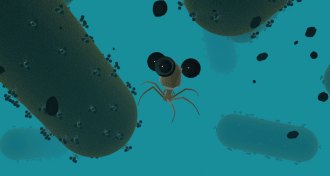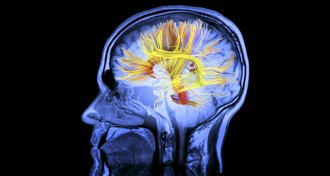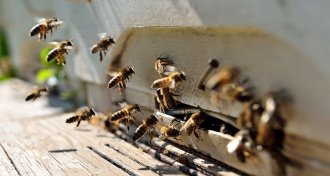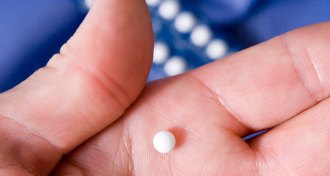News
-
 Earth
EarthPowerful New England quake recorded in pond mud
The newfound sediment signature of the 1755 Cape Ann earthquake could be used to trace other prehistoric temblors.
-
 Life
Life‘Nanobot’ viruses tag and round up bacteria in food and water
Viruses called phages evolved to hunt bacteria. With magnetic nanoparticles and genetic engineering, they become nanobots that work for us.
-
 Planetary Science
Planetary ScienceWater may have killed Mars’ magnetic field
Extra hydrogen near the Red Planet’s iron core could have shut down convection.
-
 Neuroscience
NeuroscienceWhen tickling the brain to stimulate memory, location matters
Conflicting results regarding the benefits of brain stimulation may be explained by the precise location of electrodes.
-
 Anthropology
AnthropologyModern chimp brains share similarities with ancient hominids
MRIs suggest certain brain folding patterns don’t mark ancient humanlike neural advances after all, raising questions about hominid brain evolution.
By Bruce Bower -
 Planetary Science
Planetary ScienceVenus may be home to a new kind of tectonics
Venus’ surface seems to be divided into jostling blocks of crust, defying conventional wisdom about how the surfaces of rocky planets work.
-
 Science & Society
Science & SocietyWhy science still can’t pinpoint a mass shooter in the making
Arguments flare over mass public shootings that remain scientifically mysterious.
By Bruce Bower -
 Environment
EnvironmentHow bees defend against some controversial insecticides
Some bees have enzymes that allow them to resist toxic compounds in some neonicotinoid pesticides.
By Dan Garisto -
 Life
LifeEarwigs take origami to extremes to fold their wings
Stretchy joints let earwig wings flip quickly between folded and unfurled.
-
 Earth
EarthFalse alarms may be a necessary part of earthquake early warnings
To give enough time to take protective action, earthquake warning systems may have to issue alerts long before it’s clear how strong the quake will be.
-
 Health & Medicine
Health & MedicineMale birth control pill passes a safety test
A prototype contraceptive for men safely reduced testosterone and other reproductive hormones during a month-long treatment.
-
 Planetary Science
Planetary Science5 things we’ve learned about Saturn since Cassini died
The Cassini spacecraft plunged to its death into Saturn six months ago, but the discoveries keep coming.